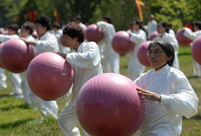 Amphibious armored vehicle unit conducts open sea drill
Amphibious armored vehicle unit conducts open sea drill
 Water relay in Henan
Water relay in Henan
 Ethnic culture feasts eyes of travelers
Ethnic culture feasts eyes of travelers
 80 security dogs assembled in Nanjing police dog training base
80 security dogs assembled in Nanjing police dog training base
 Graffiti artists paint on street walls in Xinjiang
Graffiti artists paint on street walls in Xinjiang
 Story of ceramic artist Zhang Lingyun
Story of ceramic artist Zhang Lingyun
 Magic summer night dream in Hongyuan
Magic summer night dream in Hongyuan
 Incredible creatures in headwaters drainage region of Lancang River
Incredible creatures in headwaters drainage region of Lancang River
 The future of rock n' roll seen in young rockers in China
The future of rock n' roll seen in young rockers in China
 Magnificent Yanziya Cliff
Magnificent Yanziya Cliff
BEIJING, Aug. 11 -- China's market regulator launched separate anti- monopoly probes into foreign business a few months ago and announced on Wednesday that it would punish giants including Microsoft Corp, Apple, Chrysler and Audi for their monopolistic practices.
This is an indication of a step up in the enforcement of the country's six-year-old Anti-Monopoly Law, according to experts.
As can be seen, the Chinese government’s investigations highlighted three major signals: emphasis of protection of consumer rights, law enforcement in the norm and the ambidextrous approach of administrative law enforcement.
Experts point that the Chinese government has more and more clearly realized that the prices of the products Chinese individual customers and companies purchase from foreign companies are generally higher than the prices of similar products in other countries.
For instance, Apple’s iPad mini with Retina display normally costs 470 U.S. dollar in China, whereas the same series product in the United States only costs 399 dollar.
There is no doubt the anti-monopoly law should be applied in a strict and forceful manner, so the market becomes more law-based and pro-competition.
Liu Chunyan, an associate professor of law with Tongji University, stressed the probes may continue in many sectors as supervisors will figure out the methods to enforce the law.
Hao Junbo, an anti-monopoly lawyer believed the Anti-Monopoly Law has been "dormant" since it came into force, but from now on, with practical measure, it will keep its eyes wide open.
Shen Danyang, a spokesman at China’s Ministry of Commerce, stressed the probe is not a measure particularly against foreign enterprises, but a move for establishing a fairer competition environment and therefore to keep a strong market attraction.
Shen added that official figure indicates that 70 percent of the foreign companies in China, including those from Japan, have faith in China's investment environment after the probe.
In fact, China has been attracting foreign capital for some time and is entering a mature stage. Therefore improvement and optimization of the structure and quality of the foreign companies is a primary mission for the nation, they add.
China is a late starter in terms of anti-monopoly. It launched the law as it is the inexorable requirements for a socialist market economy. But China is rapidly reaching the world day by day and a fairer, more competitive and orderly market must be formed eventually, they believe.
This is something all market players, including domestic and foreign, will benefit from in the long run.
 Beijing policewomen posters become a hit
Beijing policewomen posters become a hit Armored regiment trains on the sea
Armored regiment trains on the sea Children spend 'Father's Day' with dads at work
Children spend 'Father's Day' with dads at work 'Pan Da' appear in Shanghai World Financial Center
'Pan Da' appear in Shanghai World Financial Center Champions take selfies on podium
Champions take selfies on podium National Fitness Day celebrated around China
National Fitness Day celebrated around China Traditional culture colors summer vacation
Traditional culture colors summer vacation Young athletes fighting for their dreams
Young athletes fighting for their dreams 68 meters high thermometer in Shanxi, called ‘fighter’ of thermometers
68 meters high thermometer in Shanxi, called ‘fighter’ of thermometers 22-year-old veteran travels around China
22-year-old veteran travels around China
 Night scenery of pagoda forests
Night scenery of pagoda forests China suffers from hot summer
China suffers from hot summer 48 hours after super Typhoon Rammasun
48 hours after super Typhoon Rammasun German pianist plays mid-air ‘magic carpet’ show over Munich Airport
German pianist plays mid-air ‘magic carpet’ show over Munich Airport
 China's manned deep-sea submersible conducts dive in Pacific Ocean
China's manned deep-sea submersible conducts dive in Pacific Ocean
Day|Week|Month